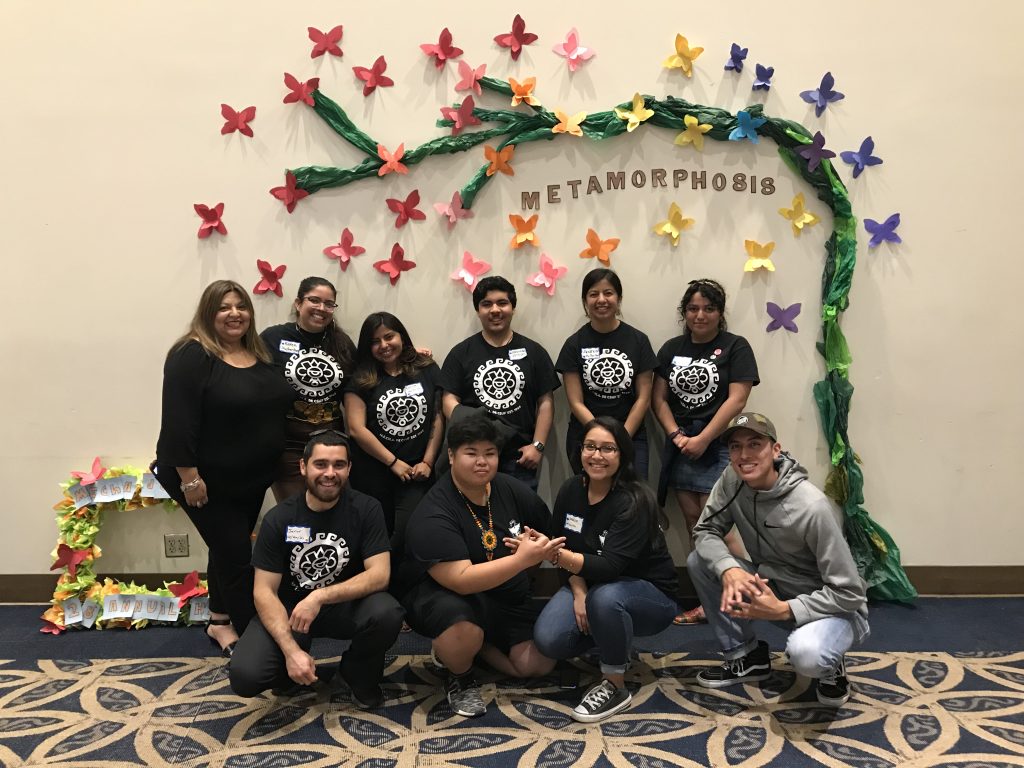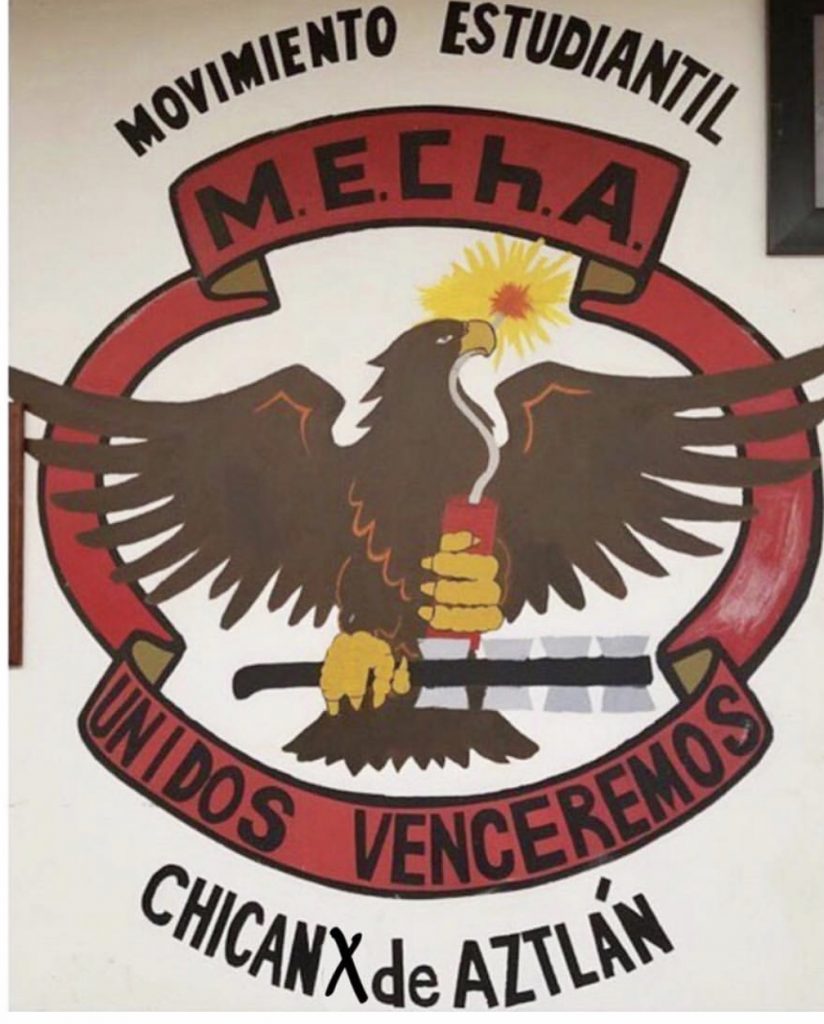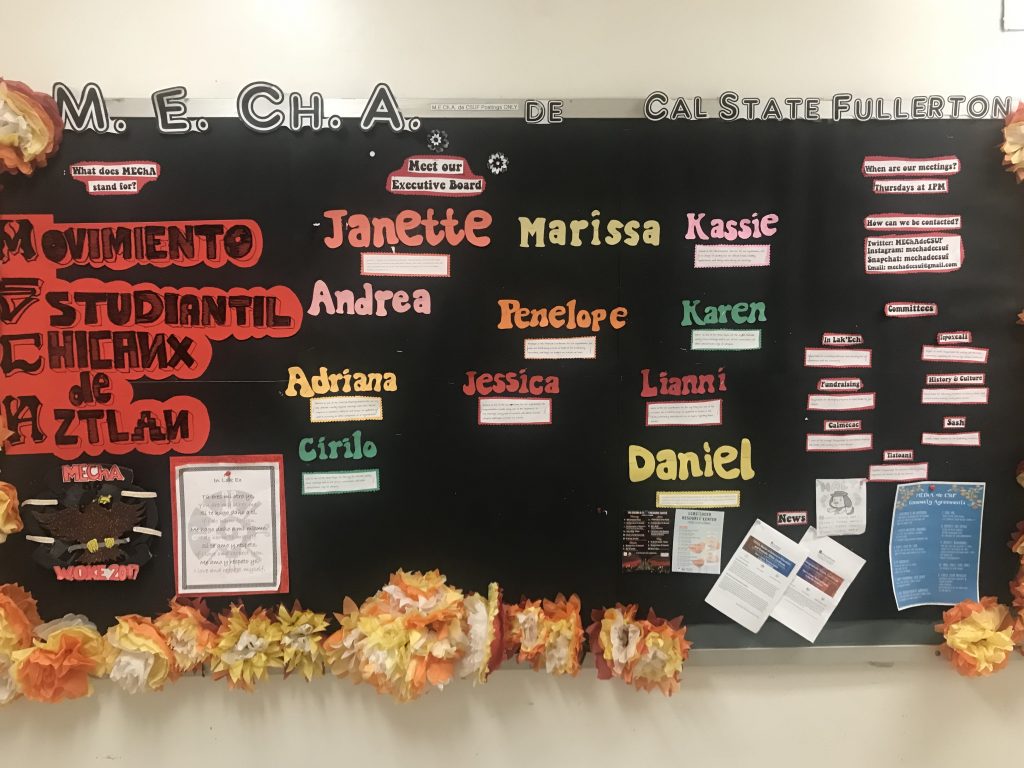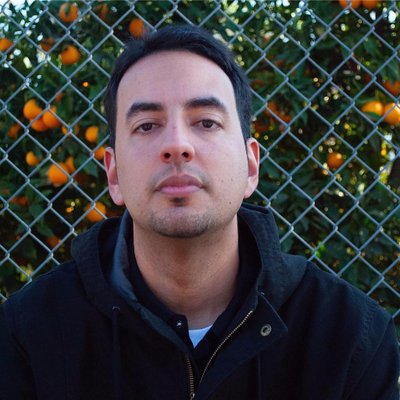
An iconic emblem of an eagle with the lit fuse of a dynamite stick clenched in its beak and a macuahuitl fastened by its talons is painted on the wall of a student activist meeting room at Cal State Fullerton. It symbolizes the Movimiento Estudiantil Chicanx de Aztlán–better known by its acronym MEChA for the past 50 years. These days, an “X” drawn on a piece of paper is taped over to make the art read “Chicanx,” updating the identity with proper gender neutrality.
Only, that’s not the change that has many former Mechistas and community members up in arms after a majority of chapters, including Cal State Fullerton, voted at MEChA’s national conference at UCLA in late March to strike “Chicanx” and “Aztlán” from the legacy organization’s name (a replacement hasn’t been selected). The more contentious debates over it have youth accosting “Chicanosaurs” for being too old to understand why the terms were scrubbed for poisoning MEChA with “anti-indigenous,” “anti-black” and “homophobic” sentiments while not being inclusive of Central Americans and other non-Mexican Latino members. On the flip side, former Mechistas derided students for being “wokosos” who sacrificed a historic group identity upon a Latinx altar in caving to anti-Chicano animus.
The backlash prompted MEChA de CSUF, in part, to put out an invitation to discuss the name change with former Mechistas and the community, following in the footsteps of MEChA de Sacramento State. By early Tuesday afternoon, two alumni showed up to talk about what happened with a dozen or so students present at their MEChA office on campus. Rather than heated exchanges over the meaning of “Chicanx” and “Aztlán,” the conversation veered towards the student group’s philosophical papeles, its decision-making process, and an apparent hiccup in how the vote happened that has the chapter rethinking its next steps.
“After we do have these discussions–it’s going to be a lengthy process–we are planning to vote again and see what our board and chapter feels,” said Penélope Lopez, MEChA de CSUF’s financial coordinator who didn’t attend nationals. “This is the first official discussion. We just really want to hear from the community and alumni.”
About nine members from MEChA de CSUF originally headed to UCLA with the intention of abstaining from the vote on behalf of their divided chapter. But something changed along the way. “After listening to the rest of the regions, the rest of the chapters, and what everyone had to say, every member that went [and] that was there present at the resolution circle, agreed unanimously that we were going to vote ‘yes’ for the name change,” said Jessica Ferrer, co-chair of MEChA de CSUF. “When we came back, there was a member that did bring up these concerns and we apologized. If we’re going to nationals, we’re supposed to be representing our chapter and that didn’t adequately happen.”
Another Mechista expressed at the meeting that he never really favored changing the name of the organization, didn’t vote accordingly at nationals and lamented that not everyone from the chapter could be present.
“It’s very important not to ever forget your papeles as a chapter,” said Anna Díaz Villela, a former MEChA de CSUF co-chair who graduated in 2012. “I was very disappointed that the collective did a decision without the chapter’s authorization.”

As the student wing of the larger Chicano Movement born in the 1960s, MEChA came into existence during the Chicano Coordinating Council of Higher Education conference held at UC Santa Barbara in 1969. At that time, students debated and decided to drop “Mexican American” from their nascent organizations like the Mexican American Youth Association in favor of calling themselves MEChA. El Plan Espiritual de Santa Bárbara, a founding document that emerged from the conference, underlined the importance of the new identity:
“Chicano, in the past a pejorative and class-bound adjective, has now become the root idea of a new culture identity for our people. It also reveals a growing solidarity and the development of pride and confidence.”
Other papeles important to the student group include El Plan de Aztlán, the Philosophy of MEChA and its constitution. Over the years, the organization graduated many community activists, professionals and prominent politicians like former Los Angeles Mayor Antonio Villaraigosa and former Lieutenant Governor of California (and recall gubernatorial candidate) Cruz Bustamante. Whenever Know Nothings caught wind of past MEChA membership–they’d charge Chicano Democrats with harboring a secret reconquista agenda!
But fifty years after the Santa Barbara conference, MEChA chapters convening at UCLA voted during the national conference last month to drop “Chicanx” and “Aztlán” from the organization’s name. No recording of the resolution circle before the vote exists, but MEChA national co-chairs put out a statement explaining the vote almost a week after it happened.
“Chicanx, which directly translates to Mexican-American, is exclusionary,” the statement read. “The use of the term ‘Aztlán’ also influences us to take part in the erasure of Indigenous peoples who are the true ancestral stewards of the U.S. Southwest.” The statement further contended that the Chicanx identity harbored xenophobia against non-Chicanx Mechistas as well as engendered anti-black and anti-indigenous violence. As for Aztlán, while it’s recognized as a philosophical ideology rooted in the Mexicas’ mythical homeland north of modern-day Mexico City, the co-chairs claimed it had “geographical consequences” in forming a belief in Chicanos that the Southwest is “Occupied Mexico” after the Mexican-American War that ended in 1848 with the Treaty of Guadalupe Hidalgo.
Carolyn Torres, a former MEChA de CSUF co-chair, heard about a proposed name change first surfacing at last year’s national conference. This March, some students suggested she facilitate the resolution circle discussion as an alumni, but Torres got asked to leave after a majority felt her membership in Orange County’s local grassroots group Chicanos Unidos would bias her in favor keeping MEChA’s historical name. A junior high teacher in Anaheim, she couldn’t attend the MEChA de CSUF community discussion during the middle of the day.
“It is telling that–and I don’t think this is just specific to Cal State Fullerton–they made this decision not knowing its impact,” Torres tells the Weekly. “Any person who’s been in MEChA and really, really understands it, would know that the alumni would respond this way.” She doesn’t recognize MEChA as it was made out to be by the vote. Torres recalls most of the chapters being women-led during her time and that MEChA proved to be generally forward thinking with regards to the LGBTQIA community.

The conversation at Cal State Fullerton didn’t rehash the major controversies over the name change vote, but did touch upon some of the rifts.
“I know we need to understand [the papeles] in order to continue moving forward but when I was a new member and I first read El Plan de Santa Bárbara , I couldn’t get through it the first time, because reading through that papel, that document, I was reminded that the movement wasn’t made for me,” said Ferrer. “It wasn’t made for mujeres or femmes. The language that was in that document–he, him, carnalismo, Chicanos–I know folks make the argument that Chicanos is inclusive of everything but it wasn’t.”
Diaz Villela countered that Mechistas have to be factual and fluid with their history and grounding documents. “All that I’ve been reading on MEChA nationals and the name change has been to really destroy the Plan de Aztlán and the Plan de Santa Bárbara because of the male-centeredness of it,” she said. “This was the only document at the time unifying our raza–whatever raza meant to them. You have to get through it in order to understand how do we become better.”
The student group expects pláticas to continue taking place over the course of months. The next discussion is scheduled for 1 p.m. tomorrow at their McCarthy Hall office on campus.
“If it turns out that we, as a chapter want to keep the name as it is, we would remain an autonomous chapter with the name that we currently have,” Ferrer said before having to leave early. MEChA de UCLA, who voted against the name change, declared autonomy from the national structure in a statement put out afterward. MEChA de San Diego State University recently decided to keep the original name after having abstained from the national conference vote. The alumni present reminded students that all MEChA chapters are already autonomous and that MEChA de CSUF could keep its name while remaining part of the organization’s national structure.
The two-hour talk ended on a good enough note.
“We hope that the conversations that we do have in the future are like this,” said Lopez, who called critique a gift. “A lot of these conversations are going to be really difficult, but I think it’s our responsibility–and I know that we can’t undo what happened at nationals–to be held accountable and take responsibility for what did happen.”
Everyone brought the plática to a close with the MEChA unity clap. Afterward, Diaz Villela and Lopez shared a hug before going about the rest of their day.

Gabriel San Román is from Anacrime. He’s a journalist, subversive historian and the tallest Mexican in OC. He also once stood falsely accused of writing articles on Turkish politics in exchange for free food from DönerG’s!


Fucking Racist Assholes! If you are so proud of that dirty, corrupt, shithole, go live there! Fuck your “Reconquista” you fucking lames! The last time you tried fucking with the US, we parked some soldiers on the Rio Grande then sent soldiers in and captured DF in a couple of days. The place was such a shithole we left it to you, and jacked Texas from you. You got punked putos! It wasn’t the first time and it won’t be the last! MEChA is a clown school! You need to do these 3 things in order, learn english, assimilate, and STFU!
You lack of culture and education is deafening.
I don’t see non-Native Indigenous people (coughcoughcoughwhitepeoplecough) taking your advice and learning to speak Cherokee/Iroquois/etc. or learning to live in nomadic societies like the Sioux or even shutting up about anything that remotely annoys them. How about white people take their own advise first then teach by example?
Someone forgot to tell Duncie Capone that Latinos are already the majority population in California , the Re-Conquista happened years ago. I suggest Duncie Capone move to Idaho and stop whining. LOL !
Also , MEChA isn’t a school but a mentally challenged Dunce like yourself wouldn’t know that. Relax and enjoy the tacos Duncie !
The Chicano Movement was never exclusive to just men, i.e. non-inclusive of our women. This type of assertion is just plain wrong while spreading a malicious false narrative. If the Chicanas of our past were in the kitchen cooking at our events… do ya think maybe… they were there “in the kitchen” because “they who were there” wanted to be there? Ask Dolores Huerta if she was ever prevented from speaking? While at it, ask “any” of the Black Panthers of our past if the Chicano activists of my era (from the early 1970s to 1990s) were in alliance with them or not? The simple answer is “Yes.” We shared the same struggles with African Americans then and now while also marching alongside each other on many, many, and many occassions… Does this mean that any historically Afro-centric organization should change their name to include any other Latinos or Asians or anyone else. No. It doesn’t. The same is true with MEChA. It has always been an organization showing pride of our indigenous Native American Chicano roots en Aztlan. Inclusion doesn not mean that one should relegate one’s own history to irrelavance. Inclusivity of heterosexuals at a LBGTQ does not mean that any such aligned organizations should abandon their historic missions and names. The same is true with MEChA. The first mistake was changing the words “Chicano” to “Chicanx”. The second mistake was to then totally abandon any strong affiliation with the Chicano community in and of itself. It could have been possible to start another organization fresh with a new mission of inclusivity of all in its name. Instead, the current membership of MEChA (sorry can’t stop using it) chose to abandon a position of solidarity with the historic mission of their founders. Again, inclusitivty does not mean the abandonment or destruction of one’s own kind….
Some BS. MEChA is not exlusionary, that’s huge lie. I just read that the national co-chairperson is Asian Peruvian. The national cochair. So then how us that an exclusionary group?
Also, the vote was controversial. People were excluded from attending the discussion and vote. Wasn’t a fair representation, sounds like.
I’m in love with the cbd products and https://organicbodyessentials.com/products/cbd-sample-pack ! The serum gave my shell a youthful boost, and the lip balm kept my lips hydrated all day. Meaningful I’m using unsullied, natural products makes me guess great. These are age my must-haves in support of a saucy and nourished look!